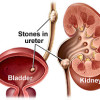
The Common Cold is a mild viral infection of the nose, throat, sinuses, and upper airways caused by several distinct families of viruses such as the Coronavirus and Rhinovirus. An average adult may expect to get a cold approximately 2 – 4 times a year, while children may expect to get colds 3 – 8 times a year. Most colds last for 4 – 5 days, and while no cure is available for the common cold, over-the-counter medications may help reduce or eliminate your cold symptoms. Symptoms Colds result from a viral inflammation of the upper respiratory tract (nose to » » » [Read more]


